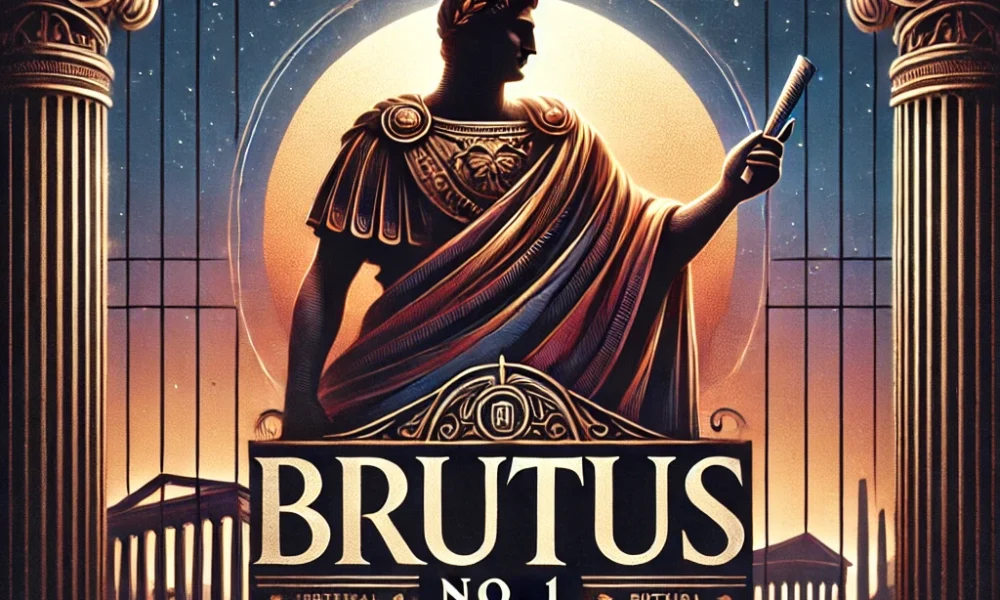Understanding Brutus No. 1: A Critical Look at Anti-Federalist Thought
When we think of the Founding Fathers and the creation of the United States Constitution, names like Alexander Hamilton, James Madison, and John Adams often come to mind.
These Federalists were instrumental in shaping the framework of the new American government.
However, the Constitution’s ratification was not without opposition.
Among the most compelling voices against it were the Anti-Federalists, and one of their most notable contributions was Brutus No. 1.
Table of Contents
Who Was Brutus?
The true identity of “Brutus” remains a mystery, but historians speculate that he was likely Robert Yates, a New York judge and staunch Anti-Federalist.
Writing under the pseudonym “Brutus”—a nod to the Roman senator who opposed Julius Caesar’s tyranny—this author penned a series of essays in 1787 and 1788 criticizing the proposed Constitution.
Brutus No. 1, published in the New York Journal, is perhaps the most famous of these essays.
The Core Argument of Brutus No. 1
At its heart, Brutus No. 1 is a warning about the dangers of centralized power.
Brutus argued that the Constitution would create a federal government so powerful that it would undermine the sovereignty of the states and the liberties of the people.
His primary concerns included:
The Supremacy Clause:
Brutus feared that the Constitution’s Supremacy Clause would render state governments obsolete, as federal laws would take precedence over state laws.
The Necessary and Proper Clause:
He criticized this clause (also known as the Elastic Clause) for granting Congress unlimited authority to pass any laws it deemed “necessary and proper,” potentially leading to abuses of power.
A Standing Army:
Brutus warned that a federal government with the power to maintain a standing army could use it to suppress dissent and enforce its will on the people.
The Size of the Republic:
Drawing on the ideas of political philosophers like Montesquieu, Brutus argued that a large republic like the one proposed by the Constitution would be unable to represent the diverse interests of its citizens effectively.
He believed that only small, localized governments could truly protect individual freedoms.
Brutus’ Vision of Government
Brutus advocated for a confederation of states with a weak central government, similar to the structure under the Articles of Confederation.
He believed that power should remain close to the people, as state governments were more accountable and better suited to protect individual rights.
For Brutus, liberty was paramount, and any government that threatened it—no matter how well-intentioned—was inherently dangerous.
Charlotte’s Web Summary: A Heartwarming Tale of Friendship, Courage, and Love
The Legacy of Brutus No. 1
While the Federalists ultimately prevailed and the Constitution was ratified, the Anti-Federalist arguments in Brutus No. 1 were not in vain.
Their critiques played a significant role in the adoption of the Bill of Rights in 1791, which addressed many of their concerns about individual liberties and states’ rights.
Today, Brutus No. 1 remains a vital piece of American political thought.
It serves as a reminder of the delicate balance between federal and state power, and the ongoing debate over how best to protect individual freedoms in a large and diverse nation.
Why Brutus No. 1 Matters Today
The questions raised by Brutus are still relevant in modern political discourse.
How much power should the federal government have?
How do we ensure that individual rights are protected in an era of expanding federal authority?
These are questions that continue to shape American politics, from debates over healthcare and education to discussions about states’ rights and federal overreach.
By revisiting Brutus No. 1, we gain a deeper understanding of the philosophical foundations of the United States and the enduring tension between centralized authority and individual liberty.
Conclusion
Brutus No. 1 is more than just an Anti-Federalist essay—it’s a timeless exploration of the challenges of governance and the importance of safeguarding freedom.
While the Federalists may have won the battle over the Constitution, the Anti-Federalists, through works like Brutus No. 1, ensured that the conversation about liberty and power would continue for generations to come.
Whether you’re a history buff, a student of political science, or simply someone interested in the foundations of American democracy, Brutus No. 1 offers valuable insights into the complexities of creating a government that is both strong and just.
FAQ’s On Brutus No. 1
1. What is the main point of Brutus No 1?
The main point of Brutus No. 1 is to warn against the dangers of a strong central government under the proposed U.S. Constitution.
Brutus argues that it would threaten state sovereignty and individual liberties, advocating instead for a decentralized government to protect freedom.
2. What did Brutus No 1 fear?
Brutus No. 1 feared the potential tyranny and concentration of power in a strong central government under the proposed U.S. Constitution, arguing it would threaten individual liberties and state sovereignty.
3. What is a famous quote from Brutus 1?
A famous quote from Brutus No. 1 is: “When the government is entrusted to so few, and those few are not chosen by the people, it will always be dangerous to their liberties.”
4. What was Brutus weakness?
Brutus’s primary weakness was his idealism and naivety.
He trusted others too easily, particularly Cassius and the other conspirators, and believed that assassinating Caesar would restore the Roman Republic without foreseeing the chaos and civil war that would follow.
His moral conflict and lack of political pragmatism also weakened his ability to effectively lead after Caesar’s death.
5. What is the Brutus theory?
The Brutus Theory suggests that Marcus Junius Brutus, one of Julius Caesar’s assassins, was actually Caesar’s illegitimate son. This theory is based on historical rumors and some ancient sources, but it lacks definitive evidence and remains speculative.
6. Who kills Brutus?
Brutus committed suicide after his defeat at the Battle of Philippi in 42 BCE.
Facing capture by Mark Antony and Octavian (later Augustus), he chose to take his own life rather than surrender.
His death marked the end of the Republican cause against the Second Triumvirate.


